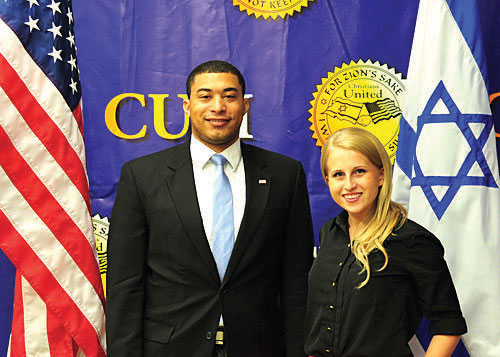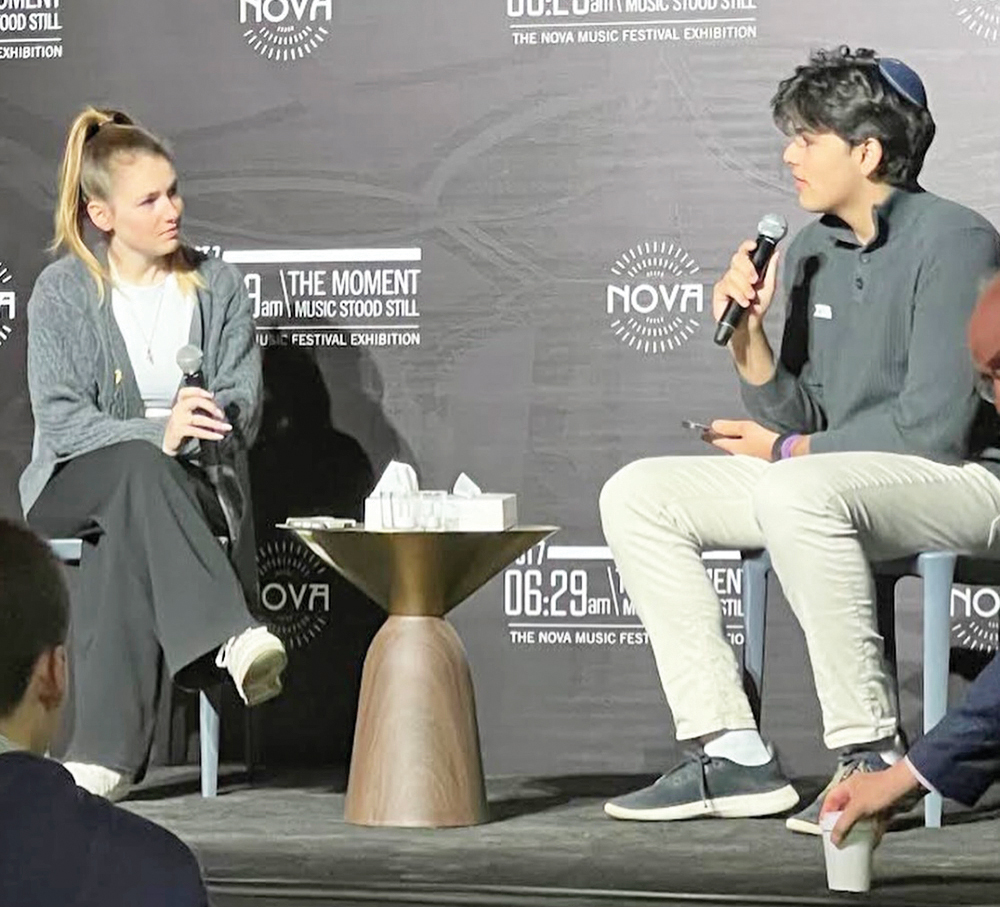.jpg)
.jpg)
WASHINGTON, DC—Sam Bain knew that life could be dangerous in southern Israel, with rockets fired indiscriminately across the border from Gaza. But it wasn’t until the Ohio college student visited an Israeli day care center near the Gaza border that the reality truly hit him.
This day care center was a bomb-safe facility. “We don’t have bomb-safe day care centers in America,” Bain told JNS.org.
“It was almost a wake-up call” about the reality of life in Israel, he said.
Bain visited the Jewish state in 2011 as part of a Christians United for Israel (CUFI) campus trip. Last week, he was one of 400 students representing 157 campuses at CUFI’s Washington Summit, which drew more than 4,000 people to the nation’s capital. Session topics included Israel 101 – The Basics of the Arab Israeli Conflict, Myths and Facts: Refuting the Negative Myths About Israel, The Biblical Mandate to Stand With Israel, A View From the Hill, with remarks by members of Congress, including Sen. Lindsey Graham (R-S.C.) and Rep. Michelle Bachmann (R-Minn.), and a video address by Israeli Prime Minister Benjamin Netanyahu.
CUFI primarily draws its support from evangelicals who cite two main drivers for their backing of Israel: one, a biblical mandate that God gave the land of Israel to the Jewish people and, two, shared values, including freedom and democracy, with the United States.
Indeed, that’s the case for the two students whom CUFI made available for interviews with JNS.org. Bain, a senior business management major at Sinclair Community College in Dayton, Ohio, and Vika Mukha, a rising senior majoring in political science and media studies at the University of California, Berkeley, both describe themselves as nondenominational Christians who grew up with positive outlooks on Israel.
Both believe there are not enough voices on behalf of Israel on college campuses. Bain, who has visited campuses across Ohio, said he’s seen anti-Israel sentiment and anti-Semitism. “It is not the most friendly environment, and they’re going to present a biased side of the issue,” he said. “You have to go in there and tell them that’s not how things are.”
The freedom “we have in this country depends on freedom in other lands,” Bain, 24, said.
Part of Mukha’s motivation stems from her roots in the former Soviet Union. Born in Belarus, she came to the United States as a baby. “I had ancestors who were persecuted in the Soviet Union because of their faith. The same people who persecuted them persecuted the Jews,” Mukha, 20, said.
At UC Berkeley, she finds herself in a hotbed of anti-Israel sentiment. Earlier this year, her college’s student government, following 10 hours of debate, passed a resolution calling up the university to divest from companies that do business with the Israel Defense Forces. (UC Chancellor Robert Birgeneau said the vote would not change the system’s investment policy.) Of the 200 people who voiced their opinions during the all-night deliberations, Mukha said, she was one of only two who spoke from a Christian perspective.
Earlier in the year, she attended a campus pastoral panel featuring four Christian ministers who criticized Israel on human rights. “They were claiming to represent Christians, but they weren’t representing me at all,” she said.
“Berkeley has over 80 Christian student organizations,” she said.
“I would love to present to them from our point of view why it is a biblical mandate” to support Israel, Mukha added.
The impetus for campus chapters came from students themselves who contacted the organization seeking information about Israel, according to David Brog, CUFI’s executive director.
Founded in 2009, CUFI on Campus has 120 chapters and has trained 2,000 students to advocate for Israel, officials say. Some chapters, such as Mukha’s, draw only a handful of members, if that many. “What you want them to do is try to do events that are well attended,” Brog said.
Sometimes the lack of interest is due to apathy, both Bain and Brog say. “At a lot of Christian schools, Israel is not a value that’s taught; we’re trying to change that,” Brog said. At other schools, where anti-Israel sentiment might be strong, people are afraid to support Israel publicly. “Not a lot of students, Jewish or not, have the guts to do it.”
That the CUFI activists aren’t Jewish can give them credibility that Jewish students, who some assume automatically will defend Israel, don’t always have. People “may wonder ‘what is this black guy from a small town in Dayton, Ohio, doing supporting Israel?” Bain said. That can help legitimize his message, he said, “because I don’t have an obvious self-interest, other than the fact I love the Jewish people.”
CUFI doesn’t staff campus chapters, but provides support for the students, including inviting them to the summit as well as to a winter student program held in San Antonio, Texas, where the organization is headquartered. In addition, up to 40 of the top students are selected for an annual trip to Israel.
A campus display at this week’s conference showed what students may be up against, from an “apartheid wall” that’s gone to national campuses to quotes from professors denigrating Israel.
Among CUFI’s campus challenges is that activists graduate. “We try to get them to replace themselves,” Brog said.
Recently, the organization has increased its social media presence. A Facebook page has more than a million “likes.” A CUFI on Campus app regularly provides users with articles about Israel, responses to anti-Israel items in the news and messages from the staff “to help keep their spirits up,” said Joshua Ahrens, CUFI’s national campus coordinator.
Not all the articles have a political perspective either, said Ahrens. “We want students to see that Israel is such a positive presence in the world,” he said. “If Israel helps farmers in India with their crops, nobody can say [the article is] biased.”
By Debra Rubin/JNS.org













